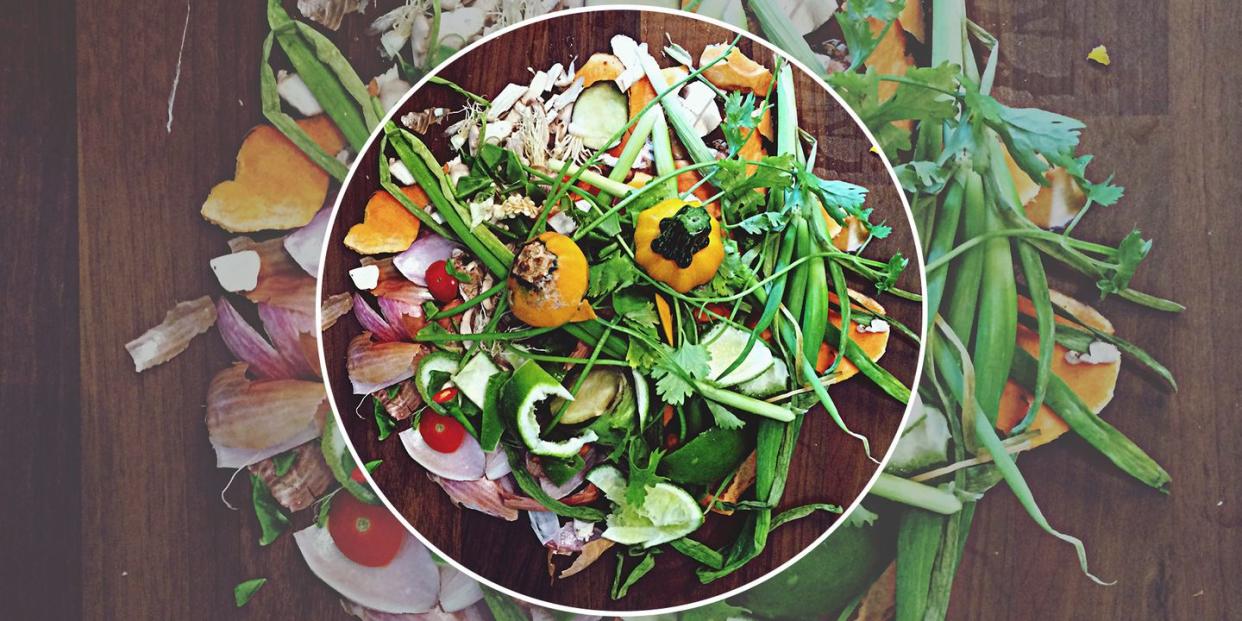It’s Hard to Care About Food Waste Until You Have To

I owe Jacques Pépin an apology.
Almost a decade ago I had the good fortune to spend a day with the French-born chef and TV trailblazer in his Connecticut kitchen. Our conversation focused on cooking techniques, and Pépin tried to school me on a variety of things that I blithely tend to ignore in the kitchen.
One of those things? Waste.
Having endured the deprivations of World War II during his childhood in France, Jacques Pépin really doesn’t like to throw stuff away—especially if an ingredient can be repurposed in a different dish. In his 2003 memoir, The Apprentice, which is one of the most essential food books ever published, Pépin writes about how his mother, forced to feed her family by using whatever scraps she could hunt down, made a sweetener by cooking down beets on a stove for hours, and conjured a sort of stir-fry from cubes of beef lung and onions and the gritty brown-red sediment scraped out of a wine barrel.
“Occasionally,” Pépin goes on in The Apprentice, “my mother got a few pounds of butter, which she would cook and salt to preserve in jars. The darkened scum that rose to the top of the butter and stuck in a ring to the sides of the pot as the butter cooked was la crasse du beurre, or ‘butter’s dirt.’ Despite the name, it had a deep, nutty taste that turned a stale piece of bread into a culinary triumph…”
Or take apple skins. As I wrote back in 2011 for The New York Times: “Famously averse to waste, Mr. Pépin skinned an apple and left the peel on the cutting board. ‘You can dry that out in the oven and make tea,’ he said. ‘It’s supposed to be good for your kidneys. We don’t throw anything out.’”
Well, I throw out… a lot. It pains me to admit it. Over the years I have had a regrettable tendency to let foods linger in my refrigerator, and my pantry, and my bread box like discarded playthings on the Island of Misfit Toys. Eventually I forget when I purchased them, so I give up and hurl them into the Basket of Oblivion.
I didn’t grow up with World War II. I grew up with reruns of Hogan’s Heroes.
But with the COVID-19 pandemic turning my house into a suburban bunker, I’m realizing that Jacques Pépin was right all along. (No surprise. As Anthony Bourdain was known to tweet, “When Jacques Pépin tells you this is how you do it? That’s how you fucking do it!”) Obviously we are galaxies away from the brutal shortages of a world war or the bare cupboards of the Great Depression, but there’s something about squirreling away dried beans and tuna fish in a closet that alters your consciousness when it comes to wasting food.
All of a sudden I wince at the thought of tossing anything into the Basket of Oblivion. If I can save it, and weave it into a different dish, I will do so. The other day I discovered a heap of leeks in the vegetable drawer of our fridge. I braised the leeks according to a recipe from chef Ned Baldwin’s forthcoming book, How to Dress An Egg.
The recipe turned out to be ridiculously easy—you don’t need anything else but olive oil and salt!—and the dish turned out to be ridiculously delicious. But I had several braised leeks left over, so the next day I chopped up the leeks and dropped them into a hot pan with some canned tomatoes, garlic, and dried oregano. Voilà, primo pasta sauce.
On another night I roasted fingerling potatoes with salt, pepper, and chopped Italian parsley as a side dish for our pork chops. I had overshot the number of potatoes; we had an extravagance of crispy tubers to pack into Tupperware. But the next day I heated them up in a pan for lunch and used the potatoes as one element of the filling for tacos. (The other elements were guacamole, Cholula hot sauce, and boquerones—yes, marinated white anchovies—that I had ordered from La Tienda, a site that specializes in food from Spain. Don’t knock it until you’ve tried it. This was a twist on something that Mexico City chef Gabriela Cámara once told me to try. A good mantra to remember: Everything can be a taco.)
No, none of this ingredient recycling can be seen as groundbreaking. I’m way behind the grandmothers of the world. French toast? Originally nothing more than a method of resurrecting stale bread. Fried rice? An ingenious way to convert leftover rice into a second feast. Wise Italian nonnas know how to fold leftover cacio e pepe into a breakfast frittata. Stretching out your pantry staples is one of the oldest tricks in human history. (Hey, where do you think fermentation came from?)
A post shared by Dave Chang (@davidchang) on Mar 23, 2020 at 7:26am PDT
But it has been fascinating to watch how the coronavirus pandemic is already changing—or maybe clarifying—our generation’s thoughts about why it’s borderline criminal to waste food. In recent posts on Instagram, Momofuku chef David Chang has been zeroing in on this very topic, encouraging people to save bacon grease (“great for a vinaigrette,” he writes) and to maximize the bang you get from scallions by doing what Korean grandmothers have done for as long as anyone knows: shove the roots into a little pocket of water by the windowsill and let the greens up top keep growing so that you can snip them off whenever you need them.
Doing something like that, in the past, never seemed necessary. Until now.
“I always thought it was embarrassing,” Chang says on Instagram. “I wish I wasn’t so stupid back then.”
Now if only Jacques Pépin would give me his apple-skin tea recipe…
You Might Also Like

